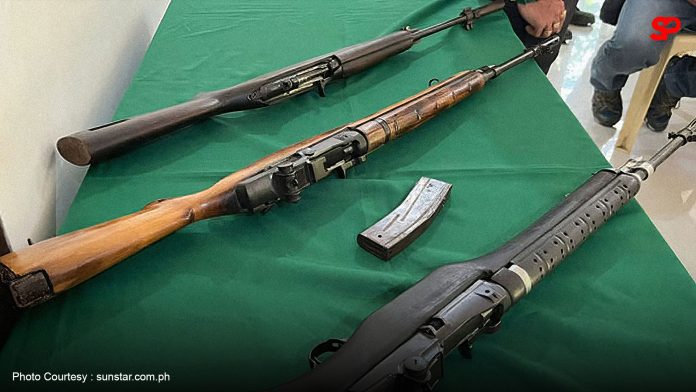By Sam Ramos
Three members of the Dawlah Islamiya-Hassan Group (DI-HG) have surrendered to authorities in Carmen, North Cotabato, on October 30, 2024, according to the military.
Identified only by their aliases “Marco,” “Midnight,” and “DTR,” the former rebels surrendered to the 90th Infantry Battalion (90IB) of the Philippine Army, handing over two M-14 rifles and a Carbine rifle as a gesture of their commitment to abandon their group.
The 90IB reported that hardship and disillusionment with the group’s objectives were key factors in the men’s decision to surrender. Seeking peace and stability for their families, the men decided to return to lawful society.
The local government of Carmen, North Cotabato, welcomed the three at the headquarters of the 602nd Infantry Brigade in Poblacion village. As an initial step to support their reintegration, the municipal government provided cash assistance and sacks of rice to each of the surrenderers. Additionally, they have promised to enroll the men in a livelihood program, helping them rebuild their lives.
The surrender of DI-HG members aligns with government efforts to address regional insurgency and terrorism through the Enhanced Comprehensive Local Integration Program (E-CLIP), which offers former combatants opportunities for reintegration and economic support. This program, in conjunction with local peace initiatives, reflects the government’s commitment to addressing the roots of extremism and promoting sustainable peace in the region.
Religious extremism in the Philippines, particularly in the southern region of Mindanao, is deeply rooted in historical, political, and socio-economic issues. The struggle dates back centuries, long before the formation of modern extremist groups, and has complex origins involving cultural and territorial disputes. The current situation, where groups like the Dawlah Islamiya continue to operate, is an extension of longstanding grievances tied to the struggle for autonomy, identity, and justice.
Historically, Mindanao has been home to a significant Muslim population, distinct from the predominantly Catholic regions of the Philippines. During Spanish colonization in the 16th century, Muslim communities in Mindanao and the Sulu archipelago resisted Spanish rule. These communities were organized under the Sultanates of Sulu and Maguindanao, which operated independently of the Spanish-controlled areas. This resistance set the stage for a centuries-long struggle for autonomy, with local leaders determined to retain their identity, religion, and territory against external influence.
Following the American colonization in the early 20th century, integration efforts by the central government intensified. The migration of non-Muslim settlers into Mindanao altered the region’s demographics, leading to the displacement of local Muslim and indigenous populations. This shift fueled resentment and heightened calls for self-governance. By the 1970s, these sentiments crystallized into organized movements seeking independence or greater autonomy. The Moro National Liberation Front (MNLF) was established in 1972, aiming for the creation of an independent Moro state. The group gained international recognition and support from countries sympathetic to its cause, but its struggle against the Philippine government was long and arduous.
In 1976, the Tripoli Agreement, brokered by the Organization of Islamic Cooperation (OIC), was the first attempt at peace, leading to a ceasefire and provisions for autonomy. However, the agreement’s partial implementation led to further splintering within the movement. The Moro Islamic Liberation Front (MILF) split from the MNLF in 1981, seeking a more religiously motivated approach to autonomy. Despite years of negotiations, peace remained elusive until the Comprehensive Agreement on the Bangsamoro (CAB) was signed in 2014, culminating in the establishment of the Bangsamoro Autonomous Region in Muslim Mindanao (BARMM) in 2019. BARMM represented a milestone, providing greater self-governance, but challenges persist as extremist factions operate within and around its borders.
Groups such as Abu Sayyaf and later the Dawlah Islamiya emerged out of splinter factions dissatisfied with peace agreements or influenced by global jihadist movements. Abu Sayyaf, for instance, was initially formed in the 1990s with an Islamist ideology, though it eventually became known for criminal activities like kidnappings for ransom. In the 2010s, the Dawlah Islamiya, inspired by the Islamic State (ISIS), began conducting violent attacks and recruitment efforts, challenging the fragile peace in Mindanao. These groups exploit local grievances, poverty, and social alienation to attract recruits, including disenfranchised youth and those marginalized by economic hardship.
The Philippine government has approached the issue through military operations, social programs, and community engagement efforts. Programs like the Enhanced Comprehensive Local Integration Program (E-CLIP) offer former combatants financial aid, livelihood training, and reintegration opportunities. Such initiatives aim to address root causes by improving access to education, healthcare, and economic opportunities in conflict-affected areas.
Though progress has been made with the establishment of BARMM, the road to lasting peace is complex. Addressing the deep-rooted causes of extremism—such as historical grievances, poverty, and the marginalization of Muslim communities—remains critical to countering radical ideologies and achieving sustainable peace. The recent surrender of Dawlah Islamiya members underscores the potential for reintegration programs to guide those disillusioned with extremism back into society, emphasizing the need for comprehensive solutions that go beyond military intervention and focus on empowerment, reconciliation, and community resilience.

